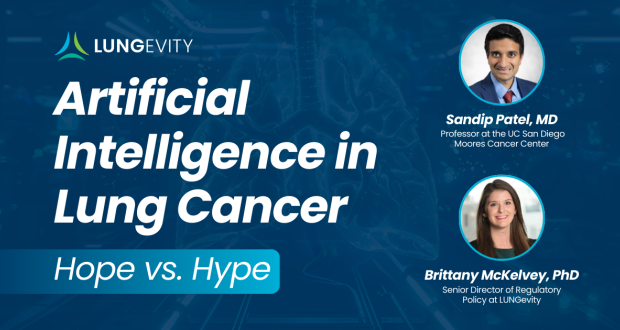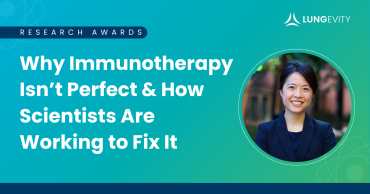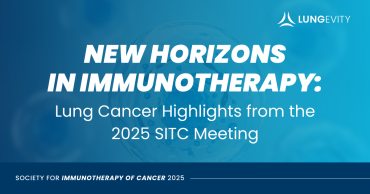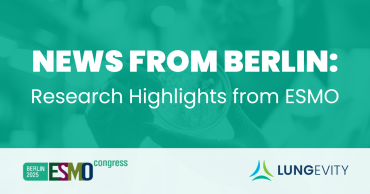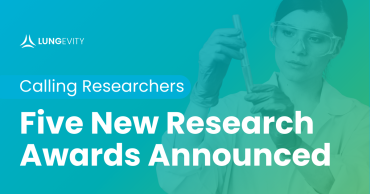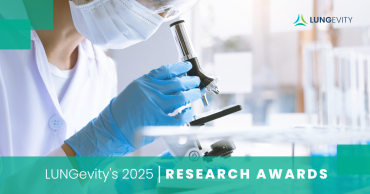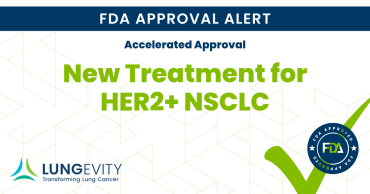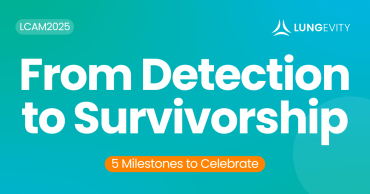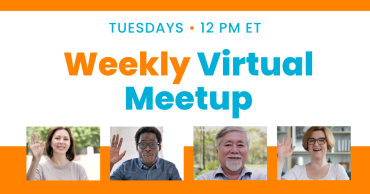-
Artificial Intelligence in Lung Cancer: Hope vs. Hype
Artificial intelligence (AI) is rapidly reshaping the future of cancer care, but such dramatic innovation also brings important questions.
AI has evolved from early consumer tools (like autocorrect on...
IN THE SPOTLIGHT
-
Why Immunotherapy Isn’t Perfect & How Scientists Are Working to Fix It
The human immune system is an intricate web of checks and balances that usually excels at detecting and destroying foreign invaders, such as bacteria and viruses, while protecting... -
New Horizons in Immunotherapy: Lung Cancer Highlights from the 2025 SITC Meeting
The Society for Immunotherapy of Cancer (SITC) celebrated their 40th anniversary at their annual meeting in National Harbor, Maryland from November 5-9, 2025. The meeting focused... -
Biggest News from Berlin: Research Highlights from ESMO
Lung cancer research was in the spotlight at the European Society for Medical Oncology (ESMO) meeting held October 17-21, 2025, in Berlin, Germany. With approximately 30,000... -
The Future of Lung Cancer Starts Here
For more than two decades, LUNGevity Foundation has been a leader in advancing lung cancer research. Since 2002, we have invested $55+ million in more than 200 research projects... -
LUNGevity Foundation Invests $1.2 Million to Fuel Next Generation of Lung Cancer Research
LUNGevity Foundation announced $1.2 million in research awards that are designed to strengthen the lung cancer workforce and accelerate progress across the lung cancer continuum... -
New Accelerated Approval for HER2-positive NSCLC
On November 19, 2025, the US Food and Drug Administration (FDA) announced the accelerated approval of sevabertinib (Hyrnuo®) to treat patients with locally-advanced or metastatic... -
Celebrating Progress in Lung Cancer: From Detection to Survivorship
Over the past twenty years, lung cancer research and care have entered a new era. One filled with hope, innovation, and progress that is transforming what it means to face a lung... -
Weekly Virtual Meetup
For patients/survivors - Join us every Tuesday at 12 pm ET for this general meetup for anyone impacted by lung cancer. After registering, you will receive a confirmation email...
Clinical outcomes and survival in patients with NSCLC and EGFR exon 20 mutations: evidence from real-world clinical practice in a retrospective study in Galicia
Clinical outcomes and survival in patients with NSCLC and EGFR exon 20 mutations: evidence from real-world clinical practice in a retrospective study in Galicia
CStone Announces MHRA Approval in UK for Sugemalimab in Stage III NSCLC
Data and Decisions in Advanced NSCLC at the 2026 TTLC Symposia – IASLC
Gut microbial signatures and immunotherapy outcomes in NSCLC and melanoma: a systematic review and meta-analysis
Gut microbial signatures and immunotherapy outcomes in NSCLC and melanoma: a systematic review and meta-analysis
ASO Author Reflections: Translating Trial Evidence into Real-World Benefit: First-Line Pembrolizumab in Advanced NSCLC
ASO Author Reflections: Translating Trial Evidence into Real-World Benefit: First-Line Pembrolizumab in Advanced NSCLC
Fawzi Abu Rous: Integrating the Latest Evidence Into the Treatment of EGFR-mutated NSCLC
Zouina Sarfraz Explores Durable Clinical Benefit with Nivolumab and Ipilimumab in Metastatic NSCLC
Zouina Sarfraz Explores Durable Clinical Benefit with Nivolumab and Ipilimumab in Metastatic NSCLC
CT-Based Radiomics Predicts the Functional State of Tumor-Infiltrating CD8+ T Cells and Prognosis in NSCLC
CT-Based Radiomics Predicts the Functional State of Tumor-Infiltrating CD8+ T Cells and Prognosis in NSCLC
Artificial Intelligence in Lung Cancer: Hope vs. Hype
Artificial Intelligence in Lung Cancer: Hope vs. Hype
Artificial intelligence (AI) is rapidly reshaping the future of cancer care, but such dramatic innovation also brings important questions.AI has evolved from early consumer tools (like autocorrect on phones, customer service chatbots, and personalized shopping recommendations) to advanced systems with the potential to revolutionize biomedical discovery and patient care. While there is tremendous excitement around AI, there is also a critical need to use it responsibly.Researchers are actively…
Why Immunotherapy Isn’t Perfect & How Scientists Are Working to Fix It
Why Immunotherapy Isn’t Perfect & How Scientists Are Working to Fix It
The human immune system is an intricate web of checks and balances that usually excels at detecting and destroying foreign invaders, such as bacteria and viruses, while protecting healthy tissue. But sometimes, the checks and balances get confused and stop the immune system from doing what’s right—such as killing tumor cells. Tumor cells are good at confusing the immune system because they originate from our healthy cells. They can often avoid detection by immune cells. Through several…
New Horizons in Immunotherapy: Lung Cancer Highlights from the 2025 SITC Meeting
New Horizons in Immunotherapy: Lung Cancer Highlights from the 2025 SITC Meeting
The Society for Immunotherapy of Cancer (SITC) celebrated their 40th anniversary at their annual meeting in National Harbor, Maryland from November 5-9, 2025. The meeting focused on multidisciplinary research aiming to leverage the immune system to improve outcomes for cancer patients, including several exciting areas of growth in lung cancer-directed immunotherapy.Tumor Imaging is Growing More Powerful Advanced imaging techniques are poised to change how we understand and treat…
The Future of Lung Cancer Starts Here
The Future of Lung Cancer Starts Here
For more than two decades, LUNGevity Foundation has been a leader in advancing lung cancer research. Since 2002, we have invested $55+ million in more than 200 research projects, helping to build a robust pipeline of discoveries in early detection, treatment innovation, and health equity.Once again, LUNGevity is ready to open our annual grant cycle in 2026 with five research programs designed to address the most pressing challenges in lung cancer care. In addition, these grants ensure the…
Biggest News from Berlin: Research Highlights from ESMO
Biggest News from Berlin: Research Highlights from ESMO
Lung cancer research was in the spotlight at the European Society for Medical Oncology (ESMO) meeting held October 17-21, 2025, in Berlin, Germany. With approximately 30,000 attendees from over 100 countries, this meeting gathered an international audience of clinicians, researchers, patient advocates, and representatives from the healthcare industry to discuss cutting-edge cancer research and share practice-changing clinical trial data. We saw data from studies that aim to build upon…
New Accelerated Approval for HER2-positive NSCLC
New Accelerated Approval for HER2-positive NSCLC
On November 19, 2025, the US Food and Drug Administration (FDA) announced the accelerated approval of sevabertinib (Hyrnuo®) to treat patients with locally-advanced or metastatic non-small cell lung cancer (NSCLC) with specific mutations in the HER2 gene. This approval is for patients who have been previously treated with HER2-targeted therapies, as well as patients who have received previous treatment that did not target HER2.Mutations in the HER2 gene (also called the ERBB2 gene) are…
LUNGevity Foundation Invests $1.2 Million to Fuel Next Generation of Lung Cancer Research
LUNGevity Foundation Invests $1.2 Million to Fuel Next Generation of Lung Cancer Research
LUNGevity Foundation announced $1.2 million in research awards that are designed to strengthen the lung cancer workforce and accelerate progress across the lung cancer continuum—from early detection to treating advanced disease.“Today’s research is tomorrow’s cure. If we want to see continued breakthroughs and advancements in lung cancer, we must secure a strong pipeline of researchers dedicated to improving outcomes for people with lung cancer,” said Upal Basu Roy, PhD, MPH, Executive Director…
Celebrating Progress in Lung Cancer: From Detection to Survivorship
Celebrating Progress in Lung Cancer: From Detection to Survivorship
Over the past twenty years, lung cancer research and care have entered a new era. One filled with hope, innovation, and progress that is transforming what it means to face a lung cancer diagnosis. From groundbreaking early detection efforts to life-extending treatments, each step forward represents years of collaboration between researchers, patients, and others in the lung cancer community.Today, LUNGevity celebrates five exciting areas of progress that highlight the incredible strides made…
Veteran Voices: Surgery to Survivorship at the VA
Veteran Voices: Surgery to Survivorship at the VA
Last November, Michael O’Donnell was at the Dallas VA during Lung Cancer Awareness Month. It’s where he receives treatment for his lung cancer, but on this specific day, he was joined by LUNGevity staff to talk with veterans about screening.“My job was easy. I was at a table with Kristi Griffith [LUNGevity’s Survivorship Navigator] so that I could answer questions as someone who uses the VA to get treated for lung cancer,” says Michael. Michael is a veteran of the Vietnam War and uses the…
New Insights in Treating Metastatic Lung Cancer from WCLC 2025
New Insights in Treating Metastatic Lung Cancer from WCLC 2025
For people with advanced or metastatic non-small cell lung cancer (NSCLC), the treatment landscape has changed dramatically in recent years. Researchers are learning how to optimize existing therapies and are exploring entirely new treatment approaches. At the 2025 World Conference on Lung Cancer (WCLC), several studies highlighted progress in treating newly diagnosed individuals as well as those who need new options after standard therapies stop working. Combining Chemotherapy and…
Biggest News in Early-Stage Lung Cancer Research from WCLC 2025
Biggest News in Early-Stage Lung Cancer Research from WCLC 2025
The annual World Conference on Lung Cancer (WCLC), organized by the International Association for the Study of Lung Cancer, is the largest global meeting dedicated to lung cancer research. WCLC 2025 showcased several important studies that focused on treating resectable (surgically removable) non-small cell lung cancer (NSCLC). Several studies showed that giving patients immunotherapy (treatments that leverage the body’s natural immune system to fight cancer) around the time of surgery…
6 Tips for Managing Scanxiety
6 Tips for Managing Scanxiety
Read time: 4 minutes.Scanxiety is a term used for the anxiety someone feels as a medical exam, like an MRI or CT scan, approaches. It can come with feelings of dread or worry, as well as “what if” thoughts focused on receiving bad news, like the return or growth of a cancerous tumor. Scanxiety can be intense and intrusive, and you might find it difficult to focus on other thoughts or tasks. Many people, especially those who did not experience anxiety prior to their diagnosis, might feel…
First Oral Targeted Therapy Approved for Advanced HER2+ NSCLC
First Oral Targeted Therapy Approved for Advanced HER2+ NSCLC
On August 8, 2025, the US Food and Drug Administration (FDA) announced the accelerated approval of zongertinib (Hernexeos®) to treat patients with unresectable or metastatic non-small cell lung cancer (NSCLC) with mutations in the HER2 gene. This approval is for patients who have been previously treated with a systemic therapy (such as chemotherapy). Mutations in the HER2 gene (also called the ERBB2 gene) are responsible for approximately 2-3% of nonsquamous NSCLCs. These mutations…
Why Do Some People Who Have Never Smoked Get Lung Cancer?
Why Do Some People Who Have Never Smoked Get Lung Cancer?
As tobacco use has declined in recent years, we have seen a new demographic of lung cancer patients emerge. Lung cancer in individuals who have never smoked (LCINS) is becoming more common. These people are often younger women with no history of tobacco exposure.Researchers are working to understand the needs of this growing population by identifying other risk factors for lung cancer, such as family history and environmental exposures. They are also studying the molecular underpinnings of this…
2025 ASCO: Highlights of Lung Cancer Research
2025 ASCO: Highlights of Lung Cancer Research
The annual meeting of the American Society of Clinical Oncology (ASCO) once again brought together nearly 50,000 members of the oncology community. From May 30 – June 2, researchers, oncologists, and patient advocates had first-hand access to the latest cancer research news. The theme for the 2025 ASCO conference was “Driving Knowledge to Action: Building a Better Future.” This theme was represented through several presentations during the conference that showcased how the cancer…
Surviving LMD: Michelle Never Settled for “No”
Surviving LMD: Michelle Never Settled for “No”
Michelle knew what was wrong. She knew the headaches, regular vomiting, ear popping, and “whooshing” sounds in her head were all signs of leptomeningeal disease (LMD). The issue, however, is that LMD is so rare—only diagnosed in 5% of people with cancer—she had to advocate for the testing to prove it.“I called my clinic and said I needed a brain MRI because I think I have LMD. They didn’t want to schedule one, so I said, tell my doctor I’m demanding a brain MRI. I can tell him directly if I…
New Treatment Approved for NSCLC with High Level of c-Met Protein
New Treatment Approved for NSCLC with High Level of c-Met Protein
On May 14, 2025, the US Food and Drug Administration (FDA) announced the approval of telisotuzumab vedotin-tllv (EMRELIS™) to treat patients with locally advanced or metastatic non-small cell lung cancer (NSCLC) with high levels of c-Met protein who have been previously treated with a systemic therapy, such as immunotherapy or chemotherapy. This ADC, or antibody-drug conjugate, is the first approval of its kind. This ADC treatment is designed with two key elements. One part of the…
Watch HOPE Summit Videos
Watch HOPE Summit Videos
HOPE Summit 2025 was filled with messages of hope, meeting new and hugging old friends, and of course the inspirational and informative sessions that help people live well with lung cancer. For the first time ever, select sessions were recorded for those who weren’t able to attend, and for those who did attend to rewatch what resonated. View the entire collection here or see below for the sessions you want to watch.HOPE Summit 2025 Recorded SessionsKeynote: Breathing Beyond Boundaries…
What Are Antibody-Drug Conjugates and How Do They Treat Lung Cancer?
What Are Antibody-Drug Conjugates and How Do They Treat Lung Cancer?
Historically, approaches to treating lung cancer included surgery, radiation, and chemotherapy. The past decade ushered in a new era of treatments with targeted therapy and immunotherapy. Now, we are seeing the emergence of another class of lung cancer treatments called antibody-drug conjugates (ADCs), that are a combination of targeted therapy and chemotherapy.ADCs act like a “smart chemotherapy” that aim to deliver the drug compound directly to cancer cells, reducing harm to healthy tissue.As…
Integrative Oncology and Lung Cancer: Adding Complementary Therapy
Integrative Oncology and Lung Cancer: Adding Complementary Therapy
What Is Integrative Oncology? Integrative oncology is the use of complementary therapies alongside conventional lung cancer treatments like chemotherapy, targeted therapy, surgery, or immunotherapy. Integrative oncology—also called integrative medicine—is an evidence-informed whole-body approach to health. It is often used to address symptoms and side effects caused by disease or treatment and improve overall quality of life. Specific examples of integrative oncology for lung cancer…
What Should Patients Know About Lung Cancer Surgery?
What Should Patients Know About Lung Cancer Surgery?
Surgery is a treatment option for early-stage lung cancer that involves removing all or part of a lung to treat a cancerous tumor. It is primarily an option for people with non-small cell lung cancer (NSCLC) staged at I, II, or IIIA. Surgery is rarely considered for tumors at stage IIIB or IV because those lung cancers have spread to other parts of the body. It is also rarely used to treat small cell lung cancer (SCLC) because SCLC is typically diagnosed at a later stage. Types of…
Conversations that Count: Transforming Lung Cancer Care Through Insight and Innovation
Conversations that Count: Transforming Lung Cancer Care Through Insight and Innovation
The LUNGevity Conversations that Count speaker series offers an opportunity to stay informed, engage in critical discussions, and learn from top experts revolutionizing lung cancer care for underserved populations. The series is intended for healthcare professionals, community health equity champions, and anyone interested in equitable access to healthcare. In February, we welcomed Randi Williams, PhD, MPH, of the Lombardi Comprehensive Cancer Center at Georgetown University Medical Center…

